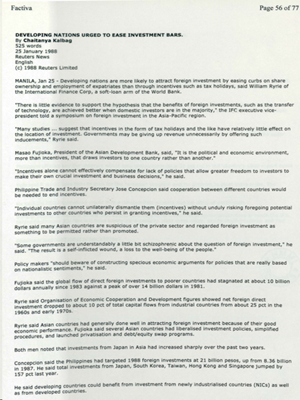DEVELOPING NATIONS URGED TO EASE INVESTMENT BARS
[Reuters]
Published date: 25th Jan 1988
View PDF25 January 1988
Reuters News
English
(c) 1988 Reuters Limited
MANILA, Jan 25 – Developing nations are more likely to attract foreign investment by easing curbs on share ownership and employment of expatriates than through incentives such as tax holidays, said William Ryrie of the International Finance Corp. a soft-loan arm of the World Bank.
“There is little evidence to support the hypothesis that the benefits of foreign investments, such as the transfer of technology, are achieved better when domestic investors are in the majority,” the IFC executive vice president told a symposium on foreign investment in the Asia-Pacific region.
“Many studies … suggest that incentives in the form of tax holidays and the like have relatively little effect on the location of investment. Governments may be giving up revenue unnecessarily by offering such inducements,” Ryrie said.
Masao Fujioka, President of the Asian Development Bank, said, “It is the political and economic environment, more than incentives, that draws investors to one country rather than another.”
“Incentives alone cannot effectively compensate for lack of policies that allow greater freedom to investors to make their own crucial investment and business decisions,” he said.
Philippine Trade and Industry Secretary Jose Concepcion said cooperation between different countries would be needed to end incentives.
“Individual countries cannot unilaterally dismantle them (incentives) without unduly risking foregoing potential investments to other countries who persist in granting incentives,” he said.
Ryrie said many Asian countries are suspicious of the private sector and regarded foreign investment as something to be permitted rather than promoted.
“Some governments are understandably a little bit schizophrenic about the question of foreign investment,” he said. “The result is a self-inflicted wound, a loss to the well-being of the people.”
Policy makers “should beware of constructing specious economic arguments for policies that are really based on nationalistic sentiments,” he said.
Fujioka said the global flow of direct foreign investments to poorer countries had stagnated at about 10 billion dollars annually since 1983 against a peak of over 14 billion dollars in 1981.
Ryrie said Organization of Economic Cooperation and Development figures showed net foreign direct investment dropped to about 10 pct of total capital flows from industrial countries from about 25 pct in the 1960s and early 1970s.
Ryrie said Asian countries had generally done well in attracting foreign investment because of their good economic performance. Fujioka said several Asian countries had liberalised investment policies, simplified procedures, and launched privatisation and debt/equity swap programs.
Both men noted that investments from Japan in Asia had increased sharply over the past two years.
Concepcion said the Philippines had targeted 1988 foreign investments at 21 billion pesos, up from 8.36 billion in 1987. He said total investments from Japan, South Korea, Taiwan, Hong Kong and Singapore jumped by 157 pct last year.
He said developing countries could benefit from investment from newly industrialised countries (NICs) as well as from developed countries.
“An added advantage of technology transfer from NICs and more advanced developing countries is that their current state of technology may be more appropriate and easily adapted to the needs of the less advanced developing countries,” he said.






